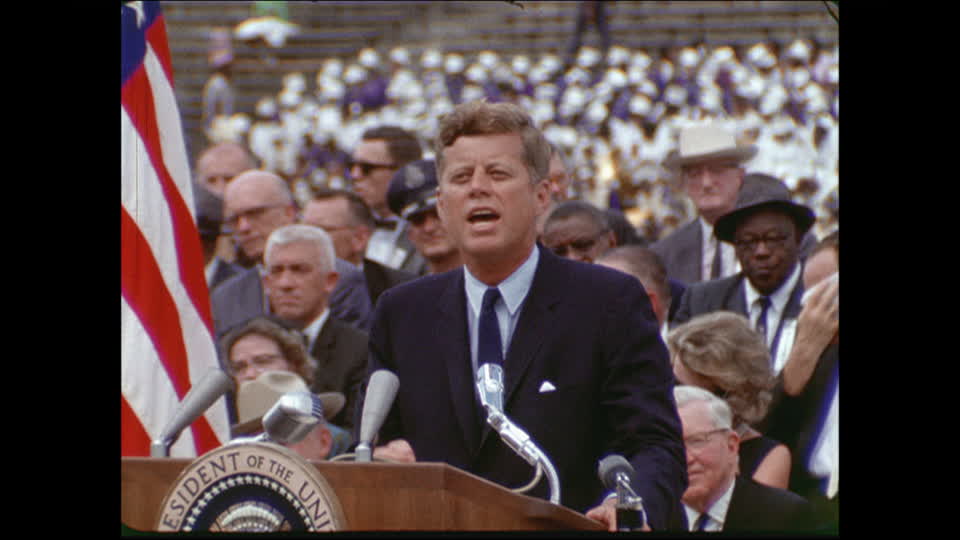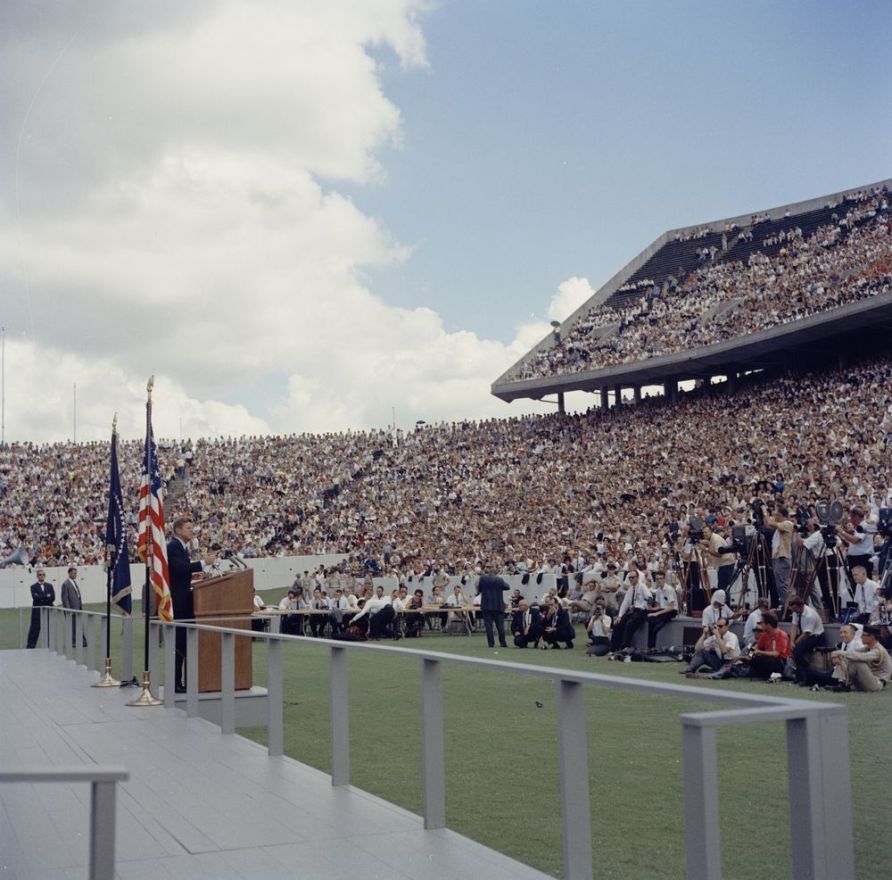JFK’s speech delivered in 1962 at Rice University in favour of the Apollo programme. Is in my opinion one of the best political speeches of the 20th century. There is a lot that can be learnt from this speech.
As I mentioned in a previous blog post, this speech is a very good example of a speech with a clear purpose and a clear objective. The purpose of this speech is to persuade the audience that going to the Moon is a worthwhile endeavour. The objective is to make listeners see the Moon programme as the next step’s in mankind journey of progress. The objective is to be accomplished using all three components of tradition oratory, Ethos, Logos and Pathos.

Ethos
Ethos is all about credibility and ethics. JFK’s opens right off the bat with references to the location of the speech to establish some rapport with the audience. He then establishes his mastery of the subject by taking the listeners on a whirlwind tour of scientific progress. Millenia of human history are condensed into just 50 years which is the lifespan of an average person. The following sentence:
“Last month electric lights and telephones and automobiles and airplanes became available. Only last week did we develop penicillin and television and nuclear power, and now if America’s new spacecraft succeeds in reaching Venus, we will have literally reached the stars before midnight tonight.”
Is masterful as it makes discoveries that everybody takes for granted look like recent achievements. It also concludes with reaching the stars which is a handy link to the speech’s topic.
Logos
Logos refers to logical arguments and facts. This part of the speech will appeal to logical minds. A lot of the timeline referred to earlier does appeal to the audience on a logical level. But the speech also includes a very factual assessment of the challenges of space flight.
“But if I were to say, my fellow citizens, that we shall send to the moon, 240,000 miles away from the control station in Houston, a giant rocket more than 300 feet tall, the length of this football field, made of new metal alloys, some of which have not yet been invented, capable of standing heat and stresses several times more than have ever been experienced, fitted together with a precision better than the finest watch, carrying all the equipment needed for propulsion, guidance, control, communications, food and survival, on an untried mission, to an unknown celestial body, and then return it safely to earth, re-entering the atmosphere at speeds of over 25,000 miles per hour.”
This whole paragraph explains the technical challenges associated with the Saturn V rocket. Facts are kept to a minimum and explained in a simple language. Two analogies feature pre-eminently too. The first one compares the height of the rocket to the length of a football field. The second ones compare the systems engineering of the rocket with a fine watch. To me though, the most masterful factual sentence of the speech is this one:
“That budget now stands at $5,400 million a year–a staggering sum, though somewhat less than we pay for cigarettes and cigars every year.”
While smoking was very common in the early 1960s the dangers of tobacco were already known back then. This sentence reduces the space programme to a matter of priorities, discovering a new frontier or indulging oneself.
Pathos
Pathos is all about appealing to emotions and building a bond with the audience. JFK’s uses a number of techniques to take the audience on an emotional journey with him. The first one is to refer to himself and the audience as ‘we’. In fact, the word ‘we’ is used 46 times throughout the speech. That’s over 2% of the speech’s word count! Everybody is playing a part in this journey into space and the great endeavour will need everybody’s contributions.
Another way in which the speech appeals to emotions is through the use of imagery. Moreover, said imagery refers to symbols that will incite positive feelings in the audience’s minds.
“Only if the United States occupies a position of pre-eminence can we help decide whether this new ocean will be a sea of peace or a new terrifying theater of war.”
Losing leadership and not embarking on this journey might mean losing the peace and space becoming a warzone.
“We choose to go to the moon. We choose to go to the moon in this decade and do the other things, not because they are easy, but because they are hard, because that goal will serve to organize and measure the best of our energies and skills.”
This sentence is strengthened by the use of repetitions. The goal is hard and worthy but this sentences also portrays it as a test of energies and skills. This is a subtle challenge to the audience and also an invitation to set asides rivalries towards achieving a common goal.
Persuading with power
Watching a video of the speech provides a few clues regarding its delivery. JFK used s ascript to delivery this speech mainly read from it, making eye contact with the audience for about half of the time. The speech lasted for less than 20 minutes and the pace of speaking was only about 120 words per minute. This is an ideal speaking rhythm for projecting authority. It also provides plenty of time for the audience to absorb the speech as it is delivered. Specific emphasis is given to key words as “doing it right and doing it first.” Eye contact is spread across the audience, which is challenging given the huge size of the audience present.

All in all, this speech is a fine example of a great persuasive speech. Back in the day it wasn’t broadcasted live or widely shown. But it would have a similar impact if delivered today with only minor edits to give reference points to present-day audiences.
Persuasive speeches can be difficult to get right and are sometimes confused with inspirational speeches. If you too are looking to persuade with power, get in touch with me and let’s craft a speech together.
Thanks alot for the analysis. Really appreciate your viewpoint on this great speech.
I will want to hear more about your analysis of great speeches.